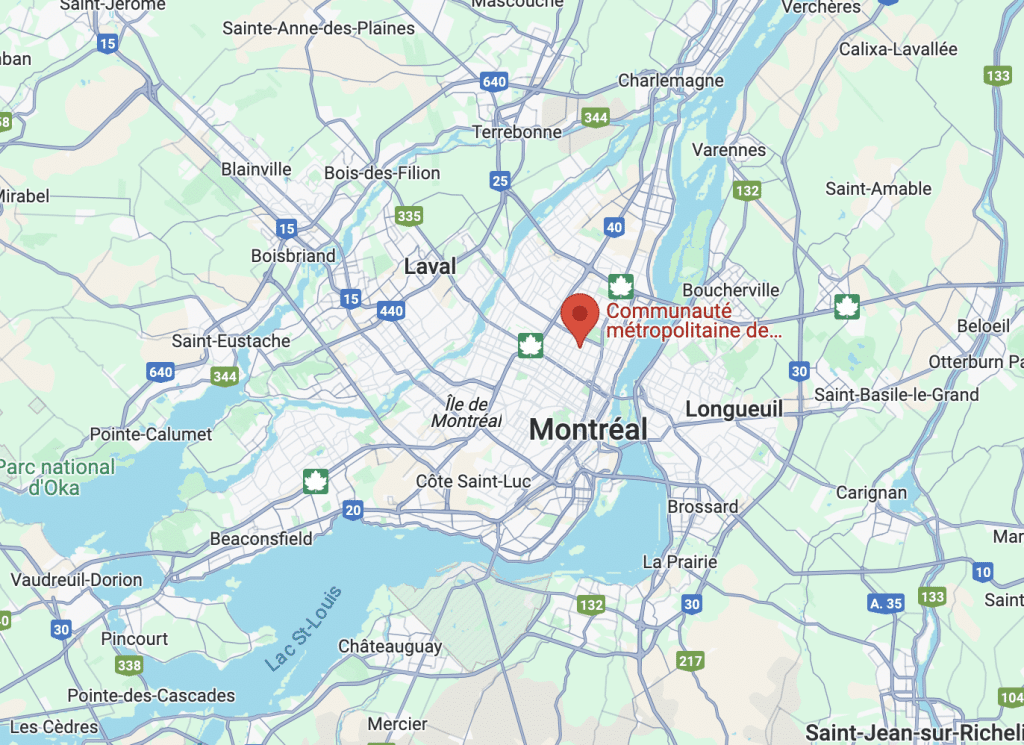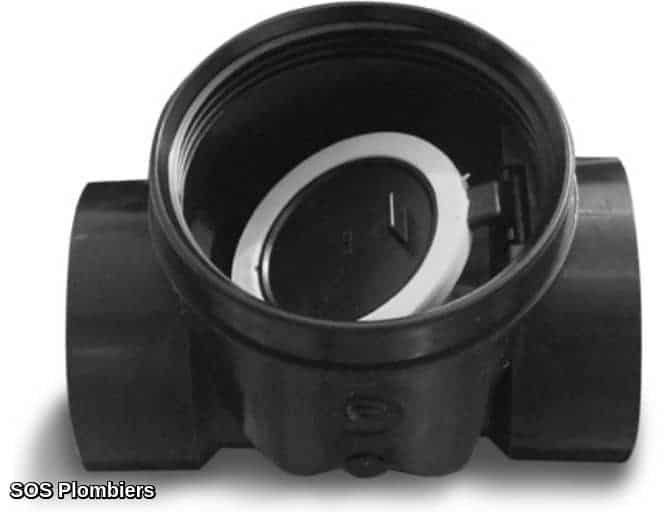
In several municipalities across the Greater Montreal Area, sewer backups caused by heavy rainfall or melting snow have become a frequent reality. A properly installed backwater valve helps prevent these costly incidents by automatically blocking the return of wastewater into your home. Whether you're in Laval, Longueuil, Montreal, or the surrounding suburbs, protecting your basement with a valve that meets local standards is more than just a precaution — it's a necessity.
Contact SOS Plumbers
(514) 418-4456
What is a check valve?
A check valve is a device installed on your drainpipe in order to automatically block sewage backflow from the municipal sewer system. If the sewer system is overloaded, it prevents contaminated water from flowing back into your basement through floor drains or toilets.
How it works
Under normal circumstances, the flap remains open to allow water to flow freely to the outside. When a backflow is detected, an internal diaphragm or flap closes under pressure, preventing any backflow into the property. This mechanism acts as an automatic barrier, without human intervention.
Other names
Depending on the region and municipal documents, the valve may also be referred to as a backwater valve, check valve, or non-return valve. All these terms refer to the same essential piece of equipment for sanitary and structural protection.
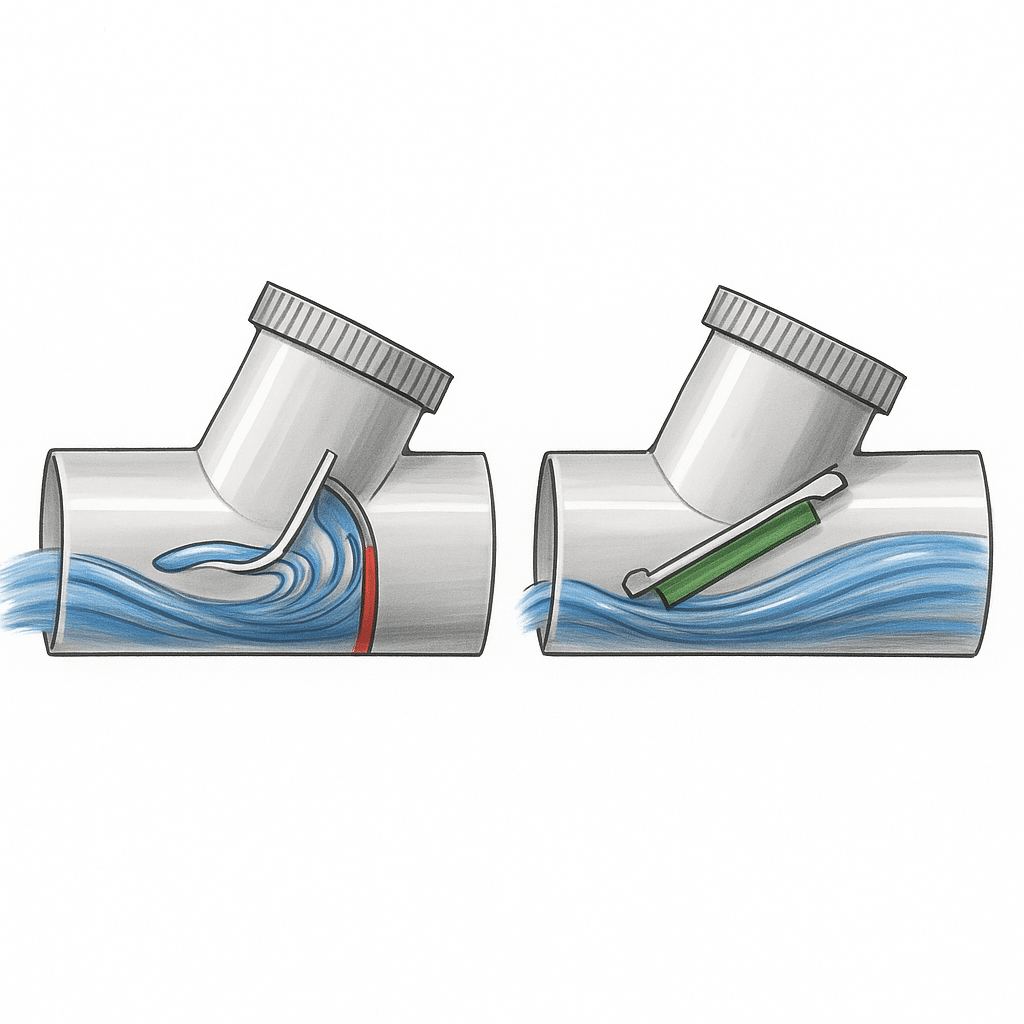
Why install a check valve in Greater Montreal?
Extreme weather events are becoming more and more frequent in Quebec, and the Greater Montreal is no exception. Episodes of intense rainfall or rapid snowmelt can overload the sewer system causing sudden backups in unprotected homes. Install a check valve is a simple, preventive solution to prevent major damage to your property.
Examples of common risks
- Sewage backup in the basement after a summer storm
- Seepage through floor drains during spring melt
- Contamination and odors caused by bacterial reflux
- Risk of mold or foundation damage
In sectors such as Rosemont, Villeray, Saint-Laurent or ChomedeyMany residents have already suffered costly flooding that could have been avoided with a simple protective device.
A recognized preventive measure
Installing a backwater valve is not only recommended by many municipalities, but it is also often required to qualify for certain subsidies or to meet insurance company requirements. This low-cost measure, compared to post-flood repairs, offers long-term peace of mind.
Is a check valve mandatory in Quebec?
Yes, in several Greater Montrealthe installation of a check valve is required by local regulations, especially for major renovations, new construction or connection to the municipal sewer system. This device is considered a minimum sanitary protection measure against sewage backflow.
Example: City of Montreal
The City of Montreal requires the installation of a non-return valve on all sewer outlets connected to the municipal network, in accordance with its by-law on sanitary and storm drainage. This requirement applies in particular to finished basements, dwellings located below the street, and buildings constructed after 2005.
Home insurance and compliance
What's more, some insurance companies may refuse a claim for water damage if the dwelling is not fitted with a backflow prevention valve. In the event of a claim, the absence of such a device is sometimes considered negligence. Installing a compliant valve therefore also protects your insurance cover.
Permit or inspection
In some cases, a certified plumber may have to apply for a permit or pass a post-job inspection. SOS Plombiers will put you in touch with a professional who is familiar with the requirements in your municipality.
What type of check valve should I choose?
There are several types of backwater valves, each with specific features depending on the plumbing configuration. The right choice depends on the installation location, drain type, water flow rate, and pipe accessibility.
Flexible diaphragm valve
Widely used in residential applications, this model uses a flexible rubber membrane. In the event of back pressure, the membrane is pressed against the wall to block the water. It's an affordable, easy-to-maintain solution, but can deteriorate more quickly in a debris-laden environment.
Rigid flap valve
This type operates with a hinged mechanical flap. It opens under the pressure of wastewater and closes in the event of backflow. More robust than the flexible diaphragm, it is recommended for main lines or properties subject to high reverse pressure.
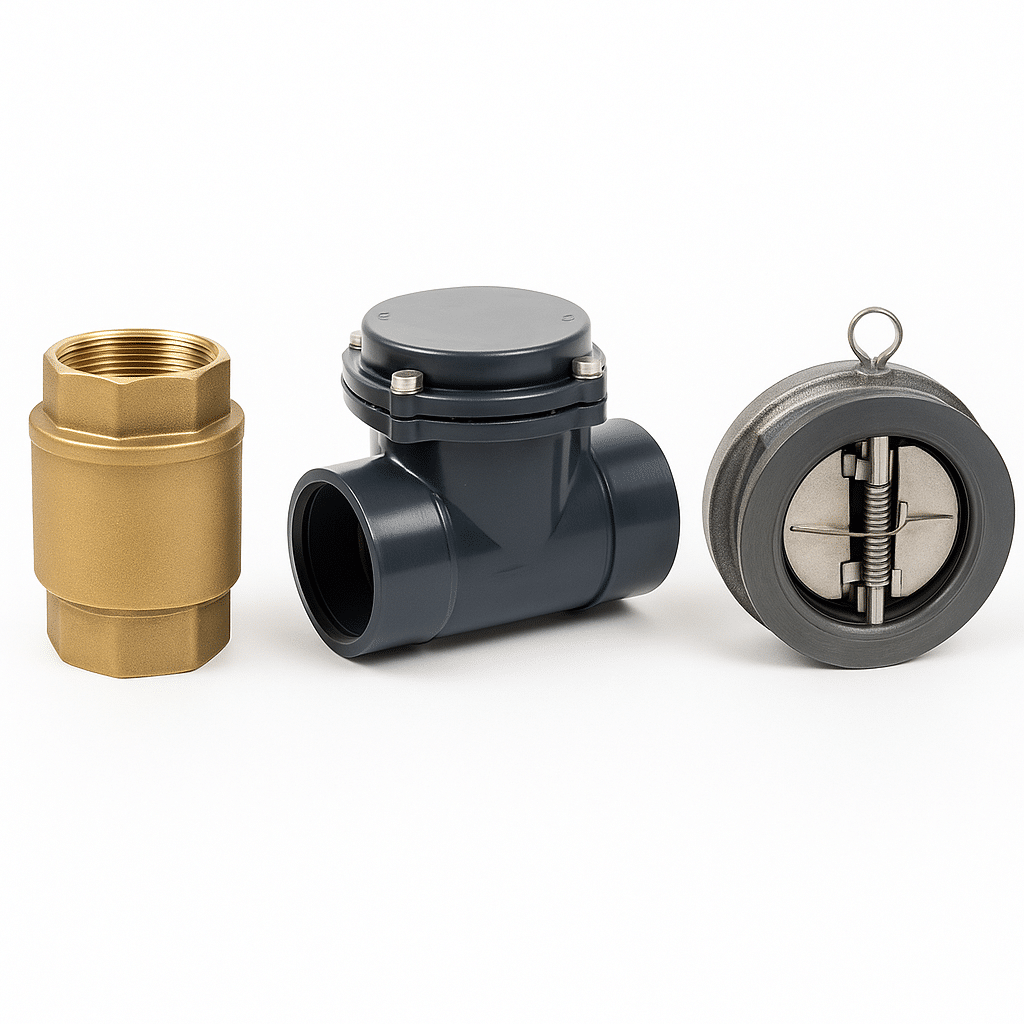
Double valve with transparent access
More advanced, this model combines a membrane and a shutter in a single housing, with a transparent cover for easy visual inspection. Ideal for sensitive areas or homeowners requiring a dual-security system.
Installation and advice
A CMMTQ certified plumber will be able to determine the most suitable model for your situation. For a replacement or first-time installation, it's essential to take into account the slope of the pipes, the level of the basement, and compatibility with the sewer system.
👉 Consult the directory of CMMTQ-certified plumbers to find a qualified professional near you.
How is a non-return valve installed?
The installation of a check valve must be carried out by a qualified plumber, since it involves the main drain modification. Depending on the configuration of your building (basement, drain level, materials in place), the job can be more or less complex.
Typical steps in a professional installation
Locating the main sewer line using a plan, a locator, or a camera inspection.
Excavation or cutting of the concrete slab to access the piping (if necessary).
Cutting and removal of a section of the existing pipe, typically made of ABS or cast iron.
Installation of the backwater valve in the correct location and oriented in the proper flow direction.
Watertight plumbing connection using approved clamps, elbows, and couplings.
Functionality test using a backflow simulation to validate the effectiveness of the device.
Backfilling and slab repair, with a clean and durable finish.
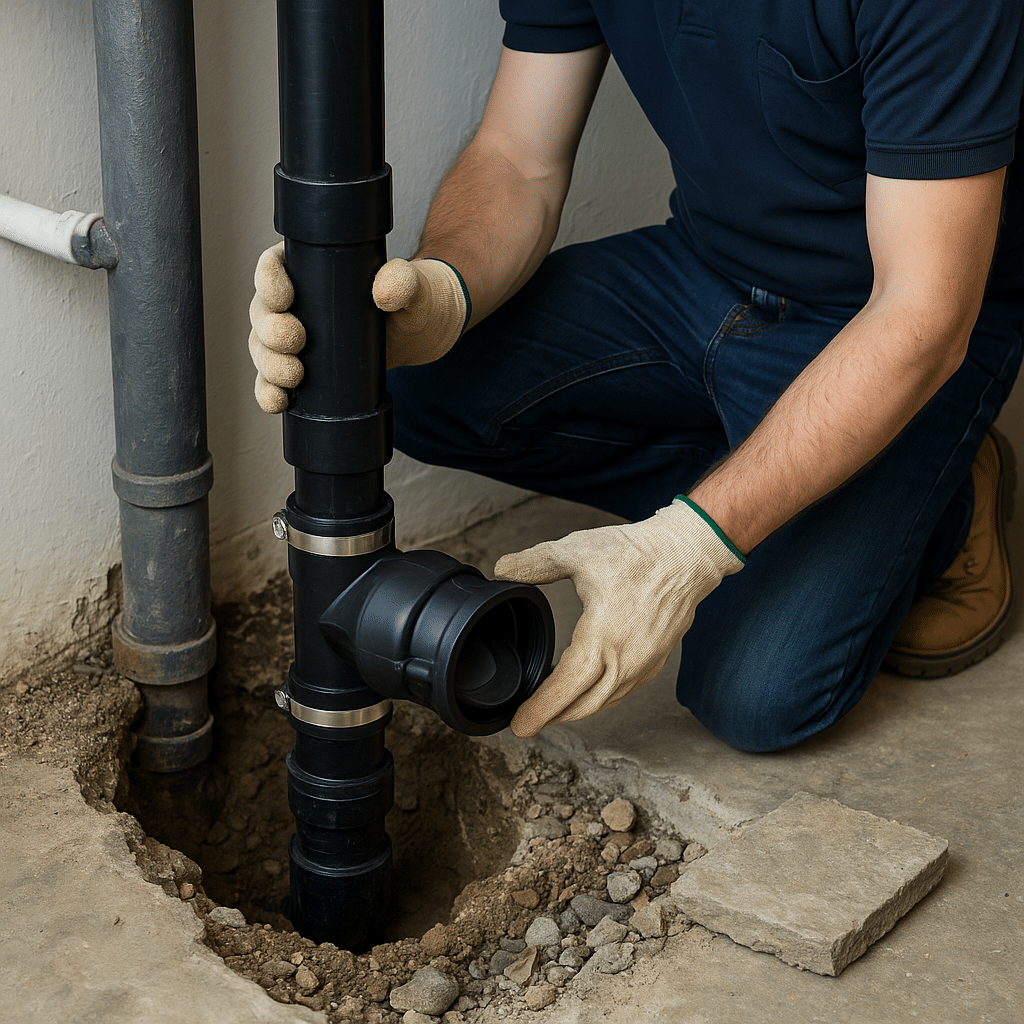
Duration of work and accessibility
In a typical single-family home in Montreal or Laval, the procedure lasts between 3 and 6 hours. If the valve is accessible through an existing manhole, installation can be completed more quickly. On the other hand, if an internal excavation is required, you'll need to plan for more extensive work.
Compliance and inspection
In several boroughs of Greater Montreal, the plumber must comply with the requirements of the municipal drainage regulation. In some cases, a final inspection by the City may be required, particularly if the work is tied to a subsidy request or a post-disaster compliance upgrade.
💡 Tip: always ask for a detailed quotation including labour, materials, finishing work and, if necessary, municipal inspection fees.
What is the cost to install a backwater valve in Quebec in 2025?
The average cost to install a backwater valve in Quebec typically ranges between $750 and $2,500, depending on the complexity of the work and accessibility of the pipes. Here's a detailed breakdown of the prices observed in Greater Montreal in 2025:
| Type of installation | Price range (CAD) | Details included |
|---|---|---|
| Simple installation (accessible valve) | 750 $ to 1,200 $ | No excavation, direct access to pipe via existing manhole |
| Standard installation | 1,200 $ to 1,800 $ | Interior excavation, slab cutting, labor included |
| Complex installation (challenging soil, adjustments) | 1,800 $ to 2,500 $ | Corrective work, slope adjustment, additional materials |
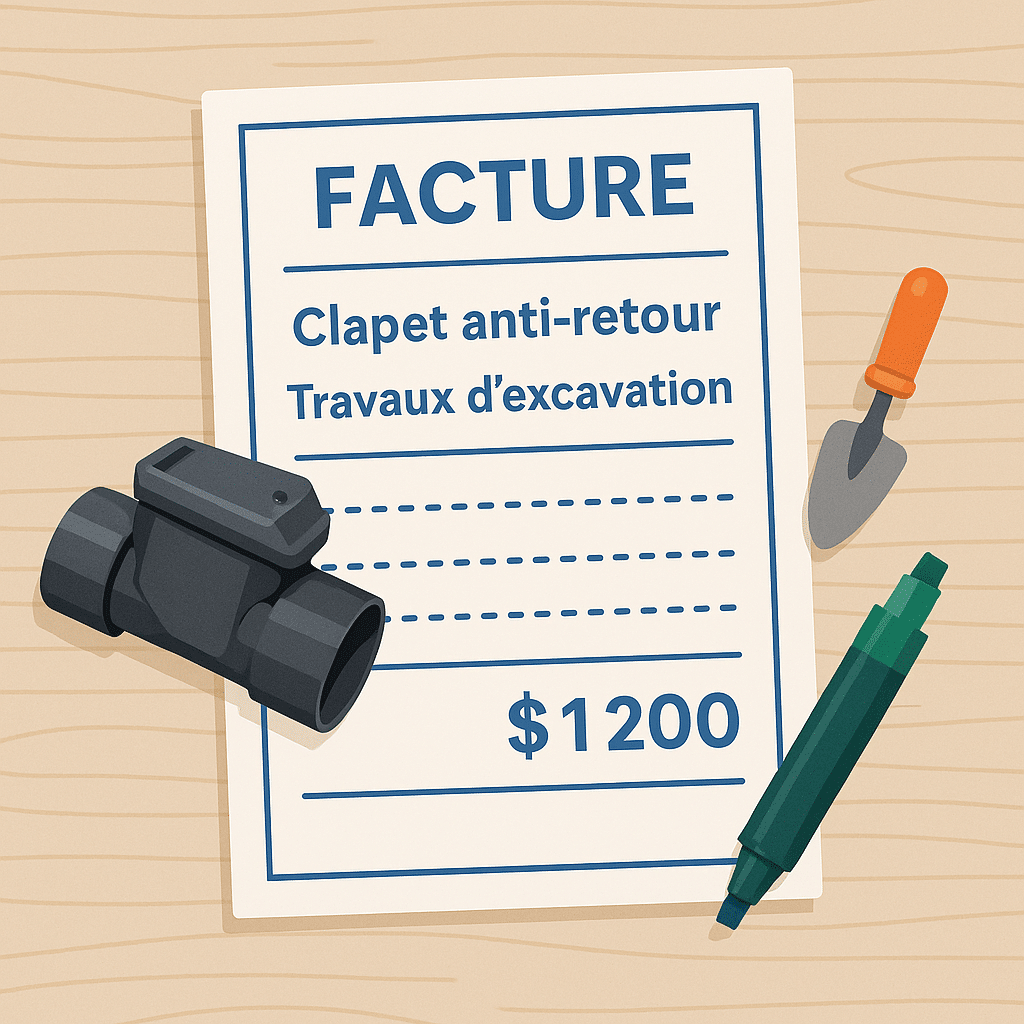
Duration of work and accessibility
In a typical single-family home in Montreal or Laval, the procedure lasts between 3 and 6 hours. If the valve is accessible through an existing manhole, installation can be completed more quickly. On the other hand, if an internal excavation is required, you'll need to plan for more extensive work.
What's usually included
- Supply of standard-compliant check valve
- Qualified, CMMTQ-certified workforce
- Excavation, cutting, fittings and sealing
- Functional testing and basic finishing
Factors influencing final cost
- Accessible driving : manhole access reduces costs.
- Valve type : some models with double shutters or locking systems are more expensive.
- Preparatory work : concrete slab, old cast-iron pipes, humidity, etc.
- Municipality : certain regulatory requirements or inspections may add to the estimate.
Available subsidies
A subsidy of $560 is available through the RénoPlex program from the City of Montreal for eligible plumbing work, including the installation of a backwater valve. This financial aid is subject to specific conditions: building eligibility, selection of a certified plumber, and a municipal inspection after the work is completed.
💡 Tip: before starting any work, ask for a detailed quotation and find out what assistance is available in your area (Montreal, Laval, Longueuil, etc.).
Check valve inspection, maintenance and service life
Like all plumbing equipment, a check valve requires a regular inspection to ensure proper operation. A poorly maintained device can become blocked, fill with debris or lose its seal, compromising the protection of your basement.
Recommended maintenance frequency
It's advisable to have your valve inspected once a year, ideally in spring or before the rainy season. In areas more prone to backflow (such as certain portions of (Rosemère, Villeray or Anjou), a bi-annual check may be wise.
Inspection steps
- Removing the valve cover through the access hole
- Check shutter or membrane condition (no cracks, good mobility)
- Cleaning accumulated deposits, sand, grease or debris
- Closing test with water to simulate backflow
Average service life
A well-maintained check valve has a service life of approx. 10 to 15 years. Factors such as water quality, backflow frequency and lack of maintenance can reduce this longevity. We recommend replace the device at the first signs of wear, or if a tight seal can no longer be guaranteed.
Calling in a professional
A certified plumber inspection can detect hidden issues that are not visible to the untrained eye. Our partners at SOS Plombiers use specialized tools to inspect the backwater valve without risking damage to your pipes. This service is quick, affordable, and could save you thousands of dollars in post-backup repairs.
💡 Tip: Bundling backwater valve maintenance with a camera drain inspection allows for a complete evaluation of your sanitary system.
Check valve services in Greater Montreal
Thanks to a vast network of certified plumbers, SOS Plombiers offers fast response times for the installation, repair, or maintenance of backwater valves throughout the Greater Montreal Area. Whether you're in the heart of the island or in the suburbs, a qualified expert can quickly be dispatched to assess your situation and provide a solution that complies with local regulations.
Montreal and its boroughs
We serve all Montreal boroughs, including Rosemont-La Petite-Patrie, Villeray-Saint-Michel-Parc-Extension, Mercier-Hochelaga-Maisonneuve and Ville-Marie. Our plumbers in Montreal can intervene even in dense or restricted access areas, often in less than 60 minutes.
North Shore: Laval, Terrebonne and surrounding areas
On the North Shore, our teams serve Laval, Boisbriand, Repentigny, and Terrebonne. Due to the high frequency of sewer backups in certain neighborhoods like Chomedey or Laval-des-Rapides, installing a backwater valve is especially recommended in this area.
South Shore: Longueuil, Brossard and Saint-Hubert
Our plumbers in Longueuil are also active in Brossard, Saint-Hubert, La Prairie and Châteauguay. These fast-growing sectors sometimes face sewerage challenges due to mixed or aging infrastructures.
Why a local network makes all the difference
Working with local plumbers means shorter response times, better knowledge of local municipal constraints, and more effective post-installation follow-up. All our partners are CMMTQ members and respect the specific bylaws of each municipality.
💡 Tip: if you have recently suffered water damage in one of these areas, contact our emergency service for immediate inspection and valve installation if necessary.
Why trust SOS Plombiers
At SOS Plombiers, our mission is simple: to quickly connect you with a certified plumber, reliable and located in your area, for anything related to the installation, maintenance, or repair of a backwater valve.
CMMTQ-certified plumbers
All professionals we recommend are members of the Corporation des maîtres mécaniciens en tuyauterie du Québec. This ensures that their work meets the highest standards of safety, compliance, and quality.
Work guarantee and price transparency
Each intervention includes a written guarantee on the work carried out. Our partners provide you with a clear quotation before any work is done - no hidden costs, no surprises. You know exactly what will be done and how much it will cost.
Fast availability, 7 days a week
Thanks to our extensive network, you can get an appointment in less than 24 hours, often the same day. Our plumbers are available 7 days a week, including evenings and weekends, to handle any emergency or scheduled service.
Verified customer reviews
Our reputation is built on authentic testimonies hundreds of satisfied customers. Whether it's a valve replacement, unclogging or a plumbing emergency, the reviews speak for themselves.
💡 Tip: Before any intervention, please consult our FAQs on check valves to prepare your questions and avoid oversights during the plumber's visit.
Frequently asked questions about check valves
A well-maintained valve can last between 10 and 15 years. However, it is advisable to have it inspected regularly to prevent failure.
Yes, in many municipalities in the Greater Montreal area, installation is mandatory when renovating or building. It is required by local by-laws and often by insurance companies.
An annual inspection is recommended, especially in spring. In areas prone to backflow, a check every 6 months is preferable.
Installation requires cutting into the pipe and sometimes excavation. To ensure compliance and efficiency, we strongly recommend that you call in a certified plumber.
In 2025, rates will vary between 750 $ and 2,500 $, depending on the accessibility of the line, the materials used and the complexity of the work.
In Montreal, the RénoPlex program can cover up to 560 $ for eligible work. Check with your borough for other possible assistance.
🚨 Avoid water damage before it's too late!
A check valve is your best protection against sewer backup and basement flooding.
Whether you're in Montreal, Laval or on the South Shore, you can count on SOS Plumbers for a fast, accurate installation at the right price.
📞
(514) 418-4456
and secure your home with a check valve installed by a certified plumber in the Greater Montreal.

